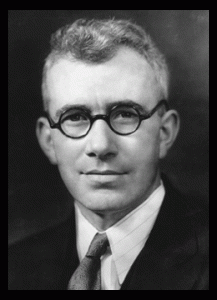This editorial first appeared in The Rutland Herald ($) and the Times Argus.
The Republican Party was in sorry shape in 1938, two years into the second term of President Franklin Roosevelt. Voters had repudiated the Republicans in 1932 and 1936 amid the misery of the Great Depression. Roosevelt stumbled in his second term, but the Republicans had not found their voice.When it came time for the meeting of the National Republican Club at the Waldorf Astoria hotel in New York City, party leaders turned to the governor of Vermont to deliver a speech addressing the nation. They got perhaps more than they bargained for.
Gov. George Aiken spoke up on behalf of the farmers and working men who had formed the Republican Party in 1854. Had they known hardships? “Yes,” Aiken said, “misery, poverty, sickness, lack of education, beset by parasites and profiteers, yet they were the strength of America, and the greatness of the nation is ever dependent on such as they.”
His catalogue of complaint against his party was lengthy.
He said the GOP was silent when a Democratic boss from New Jersey curtailed free speech and assembly because he was doing so to crush a major labor group.
He said Republicans before Roosevelt were “silent too long over the abuses of Wall Street.” Republicans had acquiesced in the neglect of farmers and in the unfair treatment of labor.
When Republicans formed a committee to chart a new course, it was dominated by banking, insurance, stock and bond sellers, manufacturing, business and lawyers and the states of the Northeast.
On the New Deal, he said that “the rank and file of the Republican Party is not opposed to federal leadership. The country needs it. We cannot tolerate Republican lip service to states’ rights simply to cover up abuses which backward states or backward big business refuse to exterminate.”
He said there was a difference between federal leadership and federal domination. The nation wants and needs federal leadership, he said.
“The federal government has not yet dominated my state,” he said, “but we welcome its leadership and cooperation. For instance, in approaching a solution to the problems of Social Security, we in Vermont are going to see to it that our system, with federal cooperation, works as well, and better if possible, than that of any other state.”
He had words of advice for Republicans obsessed with hating Roosevelt. “Forget your hatred for the president,” he said. “Stop crying ‘Fascist’ every time he makes a move. Stop worrying about Reds in the White House. Because of your reckless hatred, the minds of many American men and women are shut against your honest criticisms. Remember, the people were hungry for leadership in those dark days of 1932 and 1933. Remember, he gave it to them. He dispelled the clouds of inaction with the bright sun of leadership.”
It’s hard to imagine a Republican of national stature denouncing his party for being unfair to labor, for being too friendly with Wall Street, for using states’ rights as a cover for abuse, for failing to lead. “Forget your hatred for the president” is a cry we have not heard from the Republican leadership during the Obama administration. Nor have we heard recognition of the leadership Obama exercised in the dark days of 2008 and 2009.
Aiken went on to serve in the US Senate from 1941 until 1975, becoming perhaps the most revered political figure in Vermont history. He was the kind of moderate Republican that was common in those days. When Sen. James Jeffords abandoned the Republican Party in 2001, it was because the Aiken style of Republican was becoming extinct.
As an aside, it is interesting to note the site on the Internet where the Aiken speech is most readily available: the US Senate website of Bernie Sanders.
The views expressed in this post are the author’s alone, and presented here to offer a variety of perspectives to our readers. This post was reprinted here with the permission of the author.



